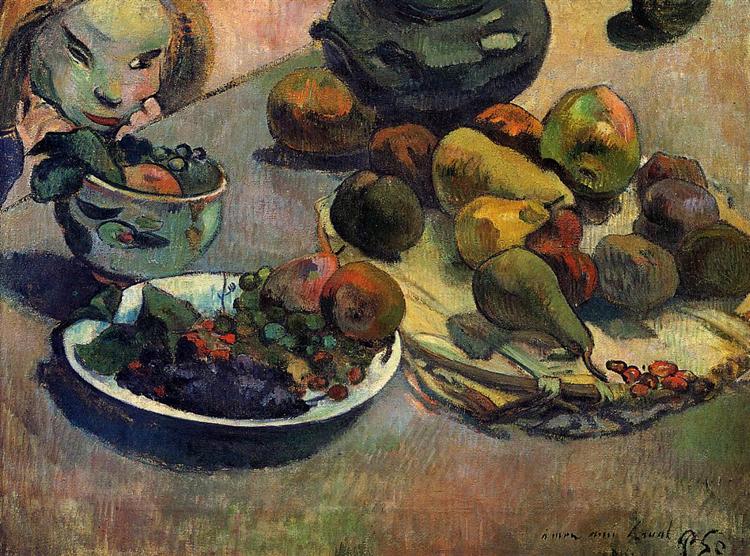Beskrivning
Paul Gauguin's painting "Fruits", painted in 1888, is a work that encapsulates the artist's search for a deeper expression of color and form, as well as his fascination with themes of nature and everyday life. In this work, Gauguin achieves a synthesis of his previous artistic experiences and his desire to investigate the essence of existence through simple, yet meaningful elements.
At first glance, the composition of “Fruits” is a vibrant celebration of color. The canvas features an array of fruits arranged in a manner that invites contemplation. The palette of the work is characterized by the use of saturated and contrasting hues that evoke the richness and beauty of nature. The bright yellows of the bananas and pears, along with the reds and purples of the grapes, create a visual effect that is both striking and harmonious. Gauguin, known for his innovative use of color, employs these hues not only to depict the object, but also to convey an emotion and atmosphere that transcends the physical.
The arrangement of the fruits in the work is equally significant. Although they are arranged in a seemingly casual arrangement, each element seems to speak to one another and generate a conversation of shapes and colors. The way the fruits intersect and juxtapose each other reflects the influence of the Japanese art that Gauguin admired, where line and composition often dance in a singular balance without the rigidity of a conventional order. This gives the painting a dynamic reminiscent of still life art, but with the intimacy and symbolism that characterize Gauguin's work.
It is interesting to note that although “Fruits” does not feature human figures, the work is imbued with the essence of the places and cultures that Gauguin wished to explore and depict. During this time, the artist was immersed in his search for art that reflected a deeper connection with the primitive and the spiritual, moving away from the European realism that had dominated much of his earlier career. Fruits, therefore, can be seen not just as mere physical objects, but as symbols of life, abundance and ephemerality, in a context that encourages reflection on the passage of time and sensory experience.
Gauguin, through “Fruits”, also offers us a glimpse into his inner world, where every colour and shape becomes a means of expressing not only the tangible, but also the emotional and spiritual. The fruits displayed on the canvas can be interpreted as a tribute to nature, a manifestation of the pleasure of life that is quickly exhausted, reminding us of the fragility and beauty of the present moment.
In the context of the Post-Impressionist movement, this work is an important milestone that leads us towards a new way of seeing things, where color and form become agents of meaning. “Fruits” invites viewers to come closer and contemplate not only the beauty visible on the surface, but also the deeper resonances that resonate in the relationship between art and human experience. Ultimately, Gauguin uses this set of fruits as a meditation on the essential, a reminder that even the simplest objects can carry with them the complexity of life and emotion.
KUADROS ©, a famous painting on your wall.
Hand-made oil painting reproductions, with the quality of professional artists and the distinctive seal of KUADROS ©.
Painting reproduction service with satisfaction guarantee. If you are not completely satisfied with the replica of your painting, we will refund 100% of your money.

